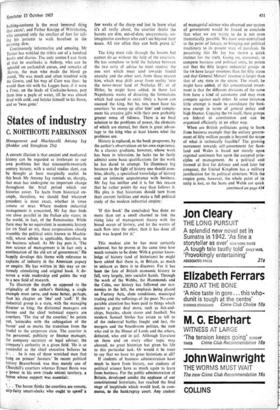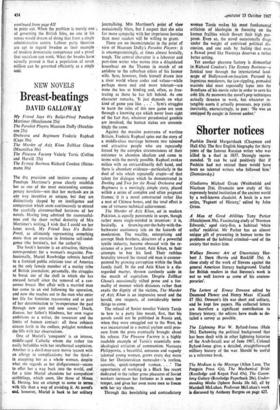States of industry
C. NORTHCOTE PARKINSON
Management and Machiavelli Antony Jay (Hodder and Stoughton 25s)
A current illusion is that ancient and mediaeval history can be regarded as irrelevant to our own problems but that nineteenth-twentieth century history, with a social studies slant, can be thought at least marginally useful. In this book Mr Antony Jay reminds us, sharply, that man has undergone no important change throughout the brief period which our histories cover. To learn from historical ex- ample, therefore, we should find whatever precedent is most exact, whether in times remote or near. Where modern industrial management is concerned, Mr Jay thus finds one close parallel in the Italian city states; in the world, in fact, of the Renaissance. While there may be no equivalent in economic history for us Steel or to, these corporations closely resemble the political units known to Machia- velli, whose advice is applicable, therefore, to the business school. As Mr Jay puts it, The new science of management is in fact only a continuation of the old art of government.' He happily develops this theme with reference to captains of industry in the American papacy or empire. He has written in this way an ex- tremely stimulating and original book. It de- serves a wide readership and points the way to a new field of research.
To illustrate the depth as opposed to the originality of the author's thinking, a single example must serve, and none better, perhaps, than his chapter on 'line' and 'staff.' If the industrial group is a state, with the managing director as king, the divisional managers are barons and the chief technical experts are courtiers. 'The rise of the courtier,' he points out, 'coincides with the subjugation of the baron' and so marks the transition from the feudal to the corporate state. The courtier is the personnel, publicity or finance manager, the company secretary or legal adviser, the company's authority in a given field. 'He is as successful as the chief executive believes he Is'. . . he is one of those wretched men that hang on princes' favours.' In recent political hiStory Beaverbrook was thus merely one of Churchill's courtiers whereas Ernest Bevin was a 'power in his own (trade union) territory, a
baron whose support was essential; =,1 . • . . The baron thinks the courtiers are remote, airy-fairy smart-alecks who ought to spend' few weeks at the sharp end just to learn what it's all really about, the courtier thinks the barons are dim, out-of-date, unsystematic, un- imaginative cowboys who can't see beyond their noses. All too often they can both proVe it.'
The king must rule through the barons but cannot do ,so without the help of the courtiers. He has somehow to hold the balance between the two sorts of advice he must receive; the one sort which must tend towards feudal anarchy and the other sort, from those nearest him, which may drift away from reality 'into the never-never land of Nicholas II'; or of Hitler, he might have added, in those last Napoleonic weeks of directing the formations which had ceased to exist. Only a baron can succeed the king, but he, too, must have his courtiers `to sweep up after him' and comple- ment his creative gifts with their own probably greater sense of tidiness. There is no final solution to the problems of power, the elements of which are eternal, but there is great advan- tage to the king who at least knows what the problems are.
History is replaced, as the book progresses, by the author's observatiosn on his own experience. As a classics graduate, however, whose work has been in television, he lacks (as he fairly admits) some basic qualifications for the work he has dared to attempt. To illuminate big business in the light of history one should com- bine, ideally, a specialised knowledge of history and an intimate acquaintance with business. Mr Jay has neither and it is for this reason that he rather points the way than follows it. His plea is that historians should turn from their current futilities and make a full political study of the modern industrial empire:
`If this book' (he concludes) 'has done no more than cut a small channel to link the rising lake of management theory with the broad ocean of history, and let the waters of each flow into the other, then it has done all that was hoped for it.'
This modest aim he has most certainly achieved, but he proves at the same time how much remains to be done. With a greater know- ledge of history (and of historians) he might have added that there is, in Britain, as much to unlearn as there is to discover. For it has been the fate of British economic history to fall, very largely, into socialist hands. Through the work of the Webbs, the Hammonds and the Coles, our history has followed our eco- nomics to the left, the emphasis being placed on Factory Acts, slum conditions, municipal trading and the sufferings of the poor. No com- parable attention has been paid to things which matter a great deal more, such as fish-and- chips, bicycles, chain stores and football. No modern Samuel Smiles has arisen to tell us of the industrial battles fought and lost, the mergers and the boardroom politics, the men who end in the House of Lords and the others, defeated, who end in jail. Although literature on these and on every other topic may abound, no great historian has given his life to this particular task. Or would it be truer to say that we have no great historians at all?
If students of business administration have much to learn from history, our students of political science have as much again to learn from business. For the public administration of Britain, developed amidst the applause of our constitutional historians, has reached the final stage of ineptitude which would lead, in com- merce, to the bankruptcy court. Any student
of managerial science who observed our system of government would be forced to conclude that what we are trying to do is not even theoretically possible. We have over-centralised to the point of lunacy, so bringing our political machinery to its present state of paralysis. In perceiving this Mr Jay has shown a quick instinct for the truth. Going on, moreover, to compare business and political units, he points out that the fifty largest industrial groups in the us have larger revenues than the fifty states and that General Motors' revenue is larger than that- of any state in the union. The result, he might have added, of this concentrated invest- ment is that the different divisions of the same firm have a kind of autonomy and may even compete against each other. In some instances little attempt is made to coordinate the busi- ness except in terms of general policy and high finance. Copying the us itself, these groups are federal in constitution and can be organised efficiently in no other way.
* When are British politicians going to learn from business example that the unitary govern- ment of fifty million people is beyond the Scope of what is technically feasible? The growing movement towards self-government for Scot- land and Wales is based not merely upon regional sentiment but upon the accepted prin- ciples of management. As a political unit formed at first for defence and used later for conquest, the United Kingdom has a military justification for its political structure. With the empire gone, however, the whole point of its unity is lost, as the Scots and Welsh are quick
continued on page 434 continued from page 431
to point out. When the problem is merely one of governing the British Isles, no one in his senses would dream of doing that from a single administrative centre. Labour party theorists are apt to regard Sweden as their example of modern democratic competence and a proof that socialism can work. What the Swedes have actually proved is that a population of seven million can be governed efficiently as a single unit.



































 Previous page
Previous page